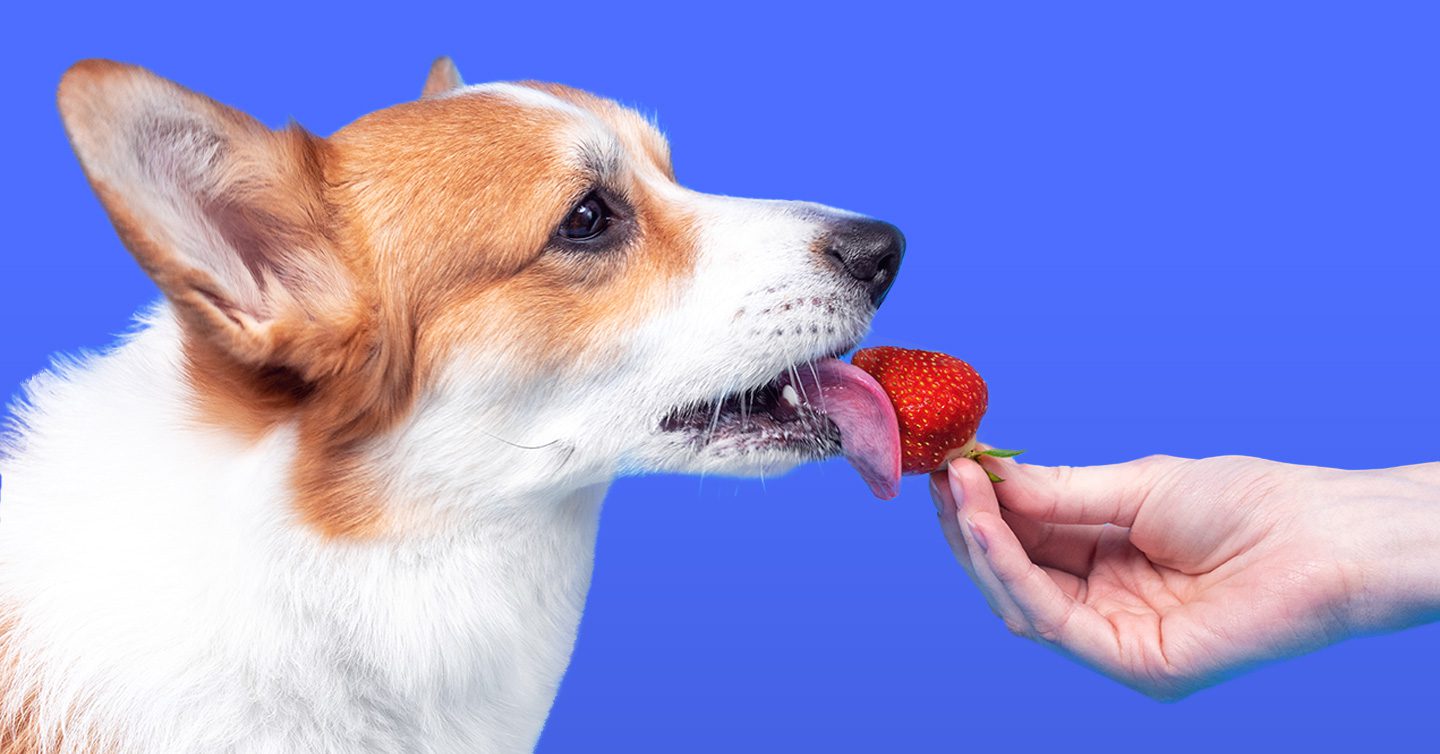Key Points
- Yes, dogs can eat strawberries, but they should be consumed in moderation.
- Avoid feeding your dog any leaves or stems attached to the strawberry.
- Too many strawberries can lead to diarrhea in dogs due to high sugar content.
Picture the scene. You’re home after a long day and need a bit of self-care. A healthy, delicious snack, some good TV, and your favorite couch companion. As you settle down with a bowl of strawberries and start the hunt for something on Netflix you haven’t already seen, you get “the look.”
You know the one.
As much as you want to share, is it safe? Can dogs even eat strawberries?
In this guide, we’ll break down the health benefits and risks so you’ve got the facts at your fingertips. We’ll even share some dog-safe, no-bake strawberry recipes so that you can get the most out of your fresh produce.
Let’s get to it.
Are strawberries safe for dogs to eat?
Yes, strawberries are safe for dogs to eat when served the right way. They should be washed and diced before being handed to your pooch.
In fact, when you give your dog a strawberry, you’re helping them stay healthy in more ways than you may think. Keep in mind that strawberries do contain natural sugar, so moderation is key.
Nutritional benefits of strawberries for dogs
Similar to blueberries and cranberries, strawberries are packed with antioxidants, low in calories, high in dietary fiber, and a good source of vitamin C. They can also help manage your dog’s weight.
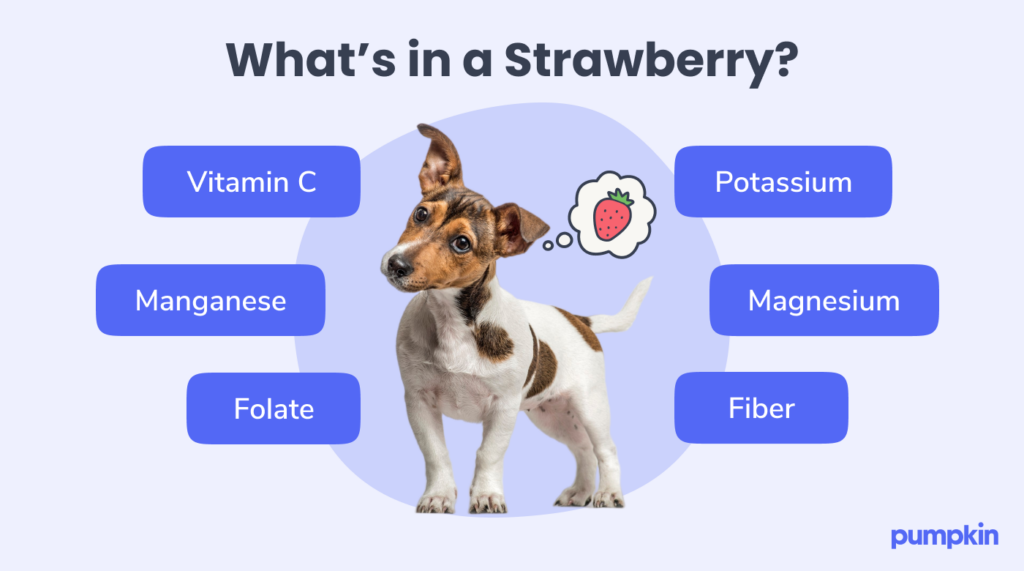
These small berries pack a nutritional punch, offering:
- Vitamin C. This powerful antioxidant goes after free radicals that destroy or alter cells. It also reduces inflammation and boosts the immune system.
- Manganese. This micro-mineral supports the metabolization of proteins and fatty acids.
- Folate (vitamin B9 or folic acid). Folate is crucial to DNA synthesis and red blood cell production.
- Potassium. This mineral supports the kidneys, heart, muscles, and digestive functions.
- Magnesium. This mineral is responsible for blood pressure regulation, bone health, heart health, energy production, and blood sugar control.
- Fiber. Healthy fiber helps digestion, assists with weight control, and can prevent constipation or diarrhea.
Can puppies eat strawberries, too?
Strawberries can be given to puppies once they start eating solid foods, usually after three to four weeks. While they shouldn’t replace regular dog food, one or two pieces will be a tasty and nutritious treat.
Before giving your pup strawberries, make sure they’re washed thoroughly to remove any pesticides and chemicals. The leaves and stem should also be removed, and the fruit itself should be cut into bite-sized pieces.
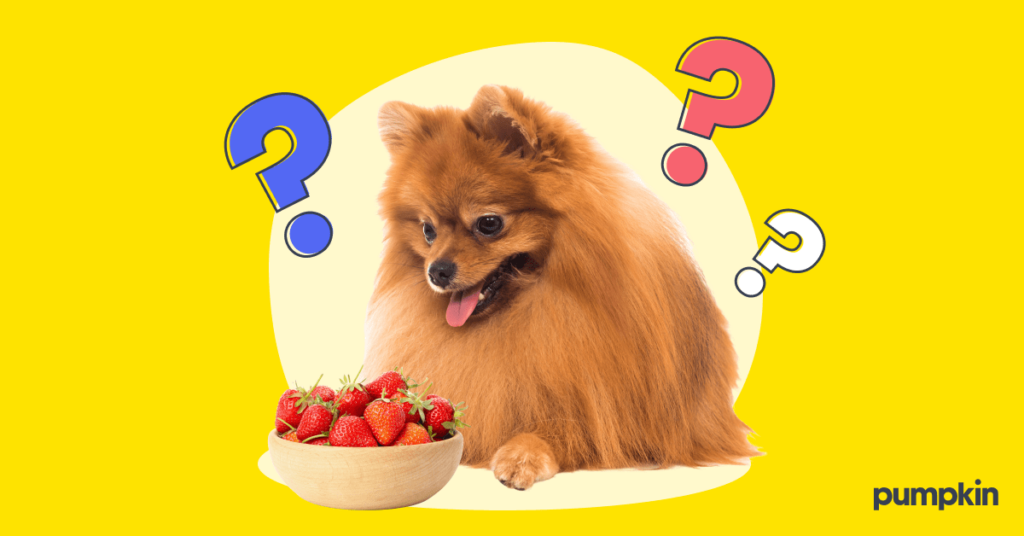
Watch your pup after giving them their first strawberry to make sure they don’t react negatively. If you notice your puppy has excessive flatulence or is showing signs of a sore stomach, they may be intolerant to the fruit.
Puppies have higher calorie needs during their first five months due to their rapid growth, even higher than an adult dog of their breed. Still, no matter your pup’s age, fruit should be a treat and no more than 10% of their daily food intake.
How many strawberries can dogs eat?
The right strawberry serving size will depend on your dog’s breed and weight. Follow these general guidelines for a good starting point:
- Small dogs: one strawberry per day cut into bite-sized pieces
- Medium dogs: up to four strawberries per day cut into bite-sized pieces
- Large to extra-large dogs: up to five strawberries per day cut into bite-sized pieces
To avoid an upset stomach, start with a few small pieces to see if your pup likes them.
If your pooch has any health conditions, such as diabetes, your vet may still put a few strawberries on the menu. For a customized meal plan, always talk to a trusted professional.
How to prepare strawberries for your dog: Do’s and don’ts
Before sharing strawberries with your dog, take a few minutes to prepare them properly. By following these do’s and don’ts, your pup can safely enjoy the antioxidant-rich fruit:
- Do wash strawberries thoroughly
- Don’t buy processed or canned strawberries and syrups with added sugars, preservatives, and dyes
- Do cut strawberries into bite-sized pieces
- Don’t buy strawberry products with artificial sweeteners like xylitol, which is very toxic to dogs
- Do slice off the top and stem. While non-toxic, these parts may lead to digestive problems.
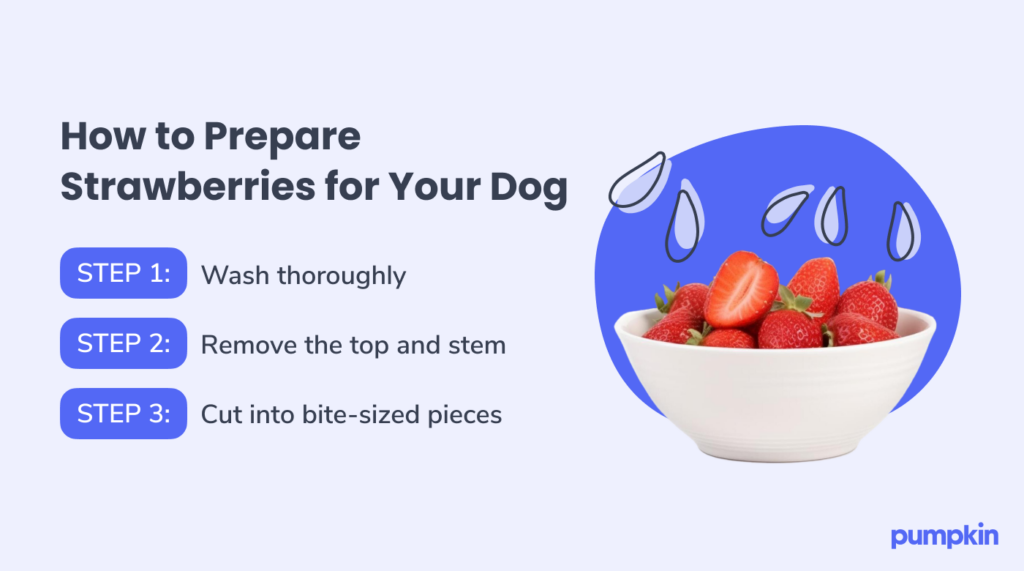
Strawberry snack ideas for dogs
Not sure how to serve your strawberries once they’re prepared? Here are some dog-safe options to suit every pup’s taste buds:
- Serve sliced strawberries fresh
- Slice and freeze them for a crunchy and cooling summer snack
- Puree or mash them and add the berry mixture to your dog’s food
- Serve strawberries over ice in the summer
- Add strawberries to plain yogurt
- Puree the berries and blend with dog-safe veggies like green beans
If you like to whip up tasty treats for your pup, you can go the extra mile with these no-baking-required strawberry snacks:
Strawberry “pupsicles”
This recipe from SnootStyle is the perfect pup-friendly treat for a hot day. Start by removing the stems and leaves from a handful of strawberries and washing them thoroughly. Chop and puree the berries with 1/3 cup plain Greek yogurt and 1 tablespoon of peanut butter (making sure both the yogurt and the peanut butter are xylitol-free).
Depending on the size of your pooch, portion the mixture into an ice cube tray or popsicle mold and freeze. In a few hours, you’ll have a DIY pupsicle that will rival any “pup cup.”
Strawberry doggy bliss balls
For this recipe from Dalmation DIY, remove the stems and leaves from four large strawberries and chop them roughly. Mash or puree them with a ripe banana and 2 tablespoons of warmed coconut oil.
Add 1/2 cup coconut flour and 2 tablespoons of ground flax. Mix thoroughly and roll into small “bliss balls.”
Tip: Whenever you introduce a new food to your dog’s diet, be sure to monitor your dog for any changes in their behavior or digestive issues.
What are the risks of dogs eating strawberries?
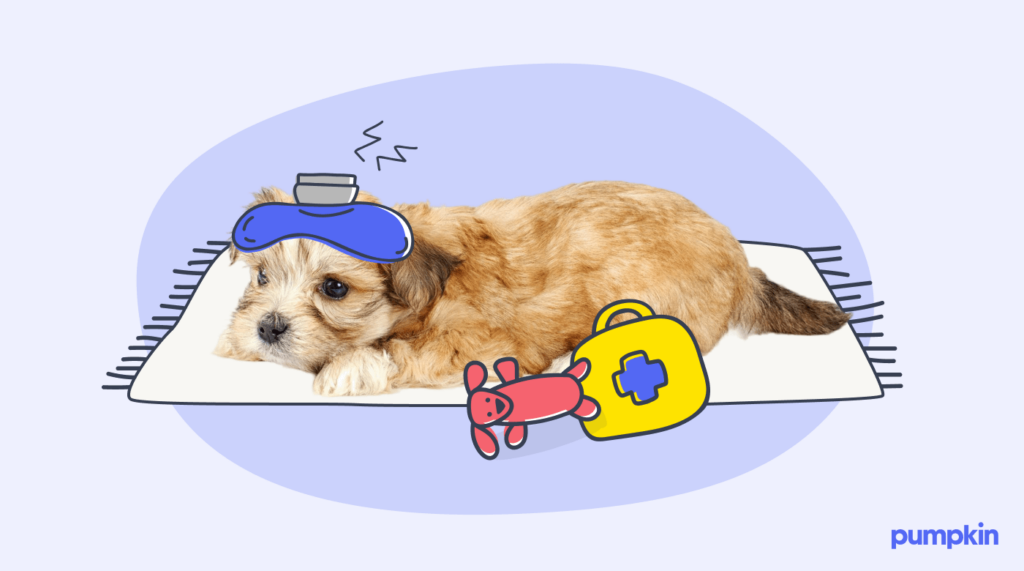
As nutrient-rich as strawberries are, they do have a few downsides that dog owners should be aware of, including:
Natural sugars: Strawberries have a high sugar content, which can cause problems if your dog is diabetic or overweight. Too much sugar can also lead to indigestion and diarrhea.
Allergies: Although a strawberry allergy is uncommon in dogs, there’s still a small chance your dog could be allergic. Watch your pup closely for common signs of an allergic reaction, including itching, vomiting, dilated pupils, bright red gums, and difficulty breathing.
Choking: Strawberries can be a potential choking hazard for young dogs. To avoid this risk, chop, mash, or puree them.
What other fruits can my dog eat?
Strawberries aren’t the only sweet fruits your dog can enjoy. In addition to strawberries, your pup can also eat:
Strawberries: A safe and healthy treat
So, can dogs have strawberries?
Strawberries are a delicious and healthy treat that you can share guilt-free. With fiber, vitamin C, and enzymes, this wonder fruit supports your pup’s immune system.
Even though they’re a healthy treat, strawberries should still be served in moderation. Before offering your dog any human food, take the time to research the benefits and potential risks.
No pet parent enjoys unexpected trips to the vet due to an allergic reaction or upset stomach. A Pumpkin Dog Insurance plan can help cover eligible vet expenses in the future so that pups get the care they need.
Are strawberries good for dogs? FAQs
- https://vcahospitals.com/know-your-pet/folic-acid
- https://www.1800petmeds.com/education/maintain-pet-potassium-levels-24.html
- https://animalwellnessmagazine.com/why-dogs-and-cats-need-magnesium/
- https://www.akc.org/expert-advice/nutrition/how-many-treats-can-dog-have/
- https://rachlmansfield.com/how-to-make-oven-dried-strawberries/
- https://snootstyle.com/blogs/news/how-to-make-frozen-strawberry-dog-treats
- https://www.dalmatiandiy.com/recipe-strawberry-banana-truffle-dog-treats/
DISCLOSURE
